- Home
- Thomas Hardy
Jude the Obscure (Barnes & Noble Classics Series) Page 2
Jude the Obscure (Barnes & Noble Classics Series) Read online
Page 2
William Dean Howells, the American novelist and editor, defended Hardy’s novel in the December 7, 1895, issue of Harper’s Weekly magazine by pointing out that the genre was tragedy: “It has not only the solemn and lofty effect of a great tragedy ... but it has unity very uncommon in the novel, and especially the English novel.” If there are displeasing elements of the book—and Howells states as much, and warns us that the novel “is not for all readers”—they are elements that Howells suggests “are deeply founded in the condition, if not the nature of humanity.” Edmund Gosse, an influential reviewer and novelist, would go further in the January 1896 issue of the journal Cosmopolis and warn that “censure is the duty of the moralist and not the critic.” Yet despite his admiration for the novel, even Gosse acknowledges that he felt disgust at certain of its elements. In defense of the novel he pleads for Hardy’s stature as reason to grant him leeway about his themes. At best, Gosse suggests, we should acknowledge the power, even if negative, of Hardy’s art: “We may dislike her, we may hold her intrusion into our consciousness a disagreeable one, but of her reality there can be no question: Arabella lives.” If Arabella lives on in the consciousness of innumerable readers of Jude the Obscure, it is an impression that has a history beginning with the novel’s first issue.
Hardy’s stature as a novelist when Jude the Obscure was published guaranteed him a certain degree of critical attention, but the attention he was to receive was so negative as to alter the course of his career. Jude the Obscure was Hardy’s final novel. In one of the strangest turns in literary history, Hardy at the age of fifty-five turned to poetry, which he continued to write until his death in 1928 at the age of eighty-eight. In letters to close friends he pretends a somewhat jaunty indifference to the negative response to Jude, but in an essay entitled “The Profitable Reading of Fiction,” which appeared in the journal Forum in 1888, Hardy’s defensiveness about readers suggests the effect the reception of his novel would have upon him:A novel which does moral injury to a dozen imbeciles, and has bracing results upon a thousand intellects of normal vigor, can justify its existence.... It is unfortunately quite possible to read the most elevating works of imagination in our own or any language, and, by fixing the regard on the wrong sides of the subject, to gather not a grain of wisdom from them, nay, sometimes positive harm. What author has not had his experience of such readers?—the mentally and morally warped ones of both sexes, who will, where practicable, so twist plain and obvious meanings as to see in an honest picture of human nature an attack on religion, morals, or institutions.
If Hardy had become wary of a certain kind of reader, his bitterness toward what he calls “the mentally and morally warped ones” did not prevent him from continuing to believe that such “imbeciles” numbered in the dozens, not the thousands. He continued to tinker with the novel in subsequent editions. In the 1903 edition he tempered the scene in which Arabella throws the pig genitals at Jude, while in the 1912 edition he introduces some two hundred small but nevertheless effectively important changes. These changes, which the edition you read here reflects, are generally considered to have been softening gestures to the depiction of Sue. For instance, as the bibliographical critic Robert Slack has shown, in the 1903 edition Jude threatens to return to Arabella unless Sue consents to live with him (and, it is inferred, become his sexual partner), and Sue agrees to it because he has “conquered” her; in the 1912 edition, Sue’s acquiescence is the result of love. The key words “I do love you” are included seventeen years after the first publication of the novel. The revisions that Hardy makes go beyond an author’s usual attention to errors in early editions. Jude clearly stayed with Hardy in the years following his switch to poetry, though whether we should understand that switch in light of a renunciation inspired by the extremity of the negative reaction to Jude or as an excuse for returning to the genre (poetry) with which he began his writing career is less certain; it was, if nothing else, a decisive one.
So why was Jude the Obscure so upsetting to many of those who read it when first published? The representation of the marriage between Jude Fawley and his wife, Arabella, conformed neither to traditional representations of courtship in the English novel, nor to contemporary standards of morality. It was accused of being indecent and permeated with coarse sexuality; even by the end of Hardy’s life, when the novel had received its due recognition and had been translated into numerous languages, Jude was remembered with admiration in Hardy’s obituary as a great novel of human sexuality. If it is difficult to understand the level of anxiety Hardy’s critique of marriage engendered, it is perhaps indicative of how far removed we are from the social context of the time, especially from the issue of marriage and divorce, which was very much in the forefront of the public consciousness in 1890. What became known as the “Parnell case” inspired a public controversy around the subject of divorce as well as becoming the cause celebre of the day. The case began with a Captain William O’Shea, who filed for divorce from his wife on the grounds of her having committed adultery with Charles Parnell, the premier Irish politician and agitator of his day. Although the divorce was granted, the English Liberal Party urged Parnell’s resignation on the grounds that his leadership was no longer tolerable. The cause of Irish Home Rule suffered an almost fatal blow from what was widely considered Parnell’s moral turpitude. Parnell died in 1891, ruined in reputation and in health, but the discussion and polemics about the question of the sacredness of marriage did not die with him.
Many people consider Jude the Obscure to be, among other things, part of that larger discussion of love and its relation to marriage and divorce that was so active in those years. It should be noted that Hardy specifically denied that Jude was a manifesto on what people at that time called “the marriage question.” Even so, his own description in the original preface to the novel in 1895 suggests that even if Hardy did not explicitly frame his novel around the sociological issues of the day, he nevertheless was quite aware that the novel spoke to the sometimes vexed relation between “flesh” and “spirit.” In describing his intention in writing Jude, Hardy wrote in the preface to the first edition: “To tell, without a mincing of words, of a deadly war waged between flesh and spirit; and to point the tragedy of unfulfilled aims, I am not aware that there is anything in the handling to which exception can be taken” (p. 3).
Jude’s “unfulfilled aims” were indeed on display in the novel’s representation of how he and Arabella came to be married; two months into a relationship that had clearly turned sexual, Jude proposes going away by himself, as he wishes “some things had never begun!” (p. 58). Arabella’s insinuation, later proved false, that she is pregnant prompts Jude to marry her, even though as he acknowledges to her that he had “never dreamt six months ago, or even three, of marrying. It is a complete smashing up of my plans” (p. 58). Hardy denied that any exception could be taken to the “handling”—what we might understand as the representational choices he made—of the tragic event. But the narrative voice describing the scene of marriage can hardly be said to be supportive of the marriage vows: “And so, standing before the aforesaid officiator, the two swore that at every other time of their lives till death took them, they would assuredly believe, feel, and desire precisely as they had believed, felt, and desired during the few preceding weeks. What was as remarkable as the undertaking itself was the fact that nobody seemed at all surprised at what they swore” (p. 59).
The critique of marriage here is based on the problem Hardy sees with extending the momentary impulse of sexual feeling into an infinite futurity; in the 1912 edition he underscored his critique by adding language (“at every other time of their lives till death took them”) that echoed the marriage vow. Here, the marriage vow is represented as a tool of exaggeration, one that extends and codifies fleeting emotion. The critique of the permanency of marriage continues when Arabella reveals that she had been mistaken in thinking herself pregnant. Jude, already disgusted by the evidence of a fake hairpiece and f
eigned dimples, is not only stunned by the revelation but cognizant that the “transitory instinct,” or sexual desire, has passed—and yet, as the narrative points out, “But the marriage remained” (p. 63). Here, the persistence of marriage as an outward form is meant to echo the persistence of objects with which the novel opens:The schoolmaster was leaving the village, and everybody seemed sorry. The miller at Cresscombe lent him the small white tilted cart and horse to carry his goods to the city of his destination, about twenty miles off, such a vehicle proving of quite sufficient size for the departing teacher’s effects. For the schoolhouse had been partly furnished by the managers, and the only cumbersome article possessed by the master, in addition to the packing-case of books, was a cottage piano that he had bought at an auction during the year in which he thought of learning instrumental music. But the enthusiasm having waned he had never acquired any skill in playing, and the purchased article had been a perpetual trouble to him ever since in moving house (p. 9).
The piano is the result of a momentary impulse; bought at auction, it fed an enthusiasm the schoolmaster used to feel for learning music that was never fulfilled. If the impulse to purchase and play the piano was brief, its persistence as a fact of the schoolmaster’s life beyond its usefulness is evident here at the description of moving day—much like the marriage that remained for Jude long after the impulse that fed that enthusiasm had waned. That Hardy opens his novel with the problem of the piano seems somewhat random unless one understands it in light of the critique of marriage to come. The opening passage’s fixation on the persistence of the piano is what we might call a first-level analysis of impulse—a critique here of a piano that is meant to shed light on or foreshadow the more complicated analysis of the persistence of marriage, beyond the life span of the impulse that inspired it, to come. Like the piano for Phillotson, the marriage that “remained” for Jude would become as the piano had for the schoolmaster: “a perpetual trouble to him ever since.”
That Hardy locates the origin of the novel’s tragedy at least in part in the persistence of the social form of marriage beyond its usefulness is evident in his postscript to the novel of 1912. That his intention was to write a tragedy is evident from his reference to Aristotle’s Poetics, as well as his realization that the potential conflict between emotions and the social contract of marriage could produce a universal tragedy: “A marriage should be dissolvable as soon as it becomes a cruelty to either of the parties—being then essentially and morally no marriage—and it seemed a good foundation for the fable of a tragedy, told for its own sake as a presentation of particulars containing a good deal that was universal, and not without a hope that certain cathartic, Aristotelian qualities might be found therein” (p. 5). The catharsis that Hardy envisions from the tragedy is evident in the postscript, but it is signaled even earlier, in the title of the novel, Jude the Obscure. The way in which Hardy fashions his title alludes quite obviously (and with the heavy irony that is Hardy’s trademark) to tragedy, particularly Greek tragedy: Jude the Obscure echoes Oedipus the King. Of course the question that immediately ensues is whether an obscure person can have a tragedy—Jude is no king, nor even a prince, as was Hamlet. Hardy signals here that he is attempting to write the tragedy of the contemporary, everyday man.
The particulars of Jude Fawley’s tragedy are the lifeblood of the novel’s plot, though the potentially universal aspects of what an obscure person’s tragedy might look like are worth exploring. We might understand the tragedy of the obscure man through three categories: the tragedy of consciousness, the tragedy of restlessness, and the tragedy of instinct. The tragedy of consciousness is particular to the person caught in obscure circumstances—the tragedy that Hardy claims ensues when one has too rich a consciousness for one’s surroundings, when one is more conscious, more aware, of what is happening to one than is necessary. Jude’s fine, even rich, sensibility creates the problems that lead to his difficult life. For instance, his finely wrought sympathy—for the birds he is hired as a child to keep away from the farmer’s corn, or the pig he cannot kill in such a way as to fetch the highest market price because that would cause the animal additional pain—is the product of a rich consciousness and sensibility that make it difficult to thrive in the social environment into which he was born. In Jude’s world we learn that coarser natures, such as Arabella’s, triumph over fine ones, and that to be one who notices everything may be counterproductive to survival. Jude’s decision to kill the pig swiftly, rather than let it bleed slowly to death to ensure a higher-quality meat, puts him at odds with Arabella, who unsentimentally declares, “Pigs must be killed” and later, “Poor folks must live” (pp. 66, 67). The tragedy of consciousness that plagues Jude is behind most of his failures, from his difficulty in walking so as not to kill earthworms to his inability as a working-class man to become a scholar at Christminster.
The tragedy of the contemporary everyday man, the novel seems to suggest, would also partake of a tragedy of restlessness. If one turns to the novel’s table of contents, one might notice that it is structured in an intriguing way, in six parts, each of which is named after a place (“At Marygreen,” “At Christminster,” “At Melchester,” “At Shaston,” “At Albrickham and Elsewhere,” “At Christminster Again”). The novel is, quite obviously, about mobility. However, the kind of mobility that Jude experiences is not the kind of heroic upward mobility one sees, for instance, in Jane Austen’s Mansfield Park, where the main character, Fanny Price, achieves a higher social class by virtue of her exceptional virtue, and where her ascension is signaled by a geographic transplantation, from the socially murky world of Portsmouth to the rural gentility of Mansfield. Jude the Obscure depicts instead a restless, modern mobility, a mobility where one moves back and forth to no apparent purpose. Notice as you read Jude the Obscure the amount of moving around that occurs, and the novel’s interest in forms of transportation (walking, carts, coaches, and especially trains) and what is possible psychologically and socially as a result of each of these forms of transportation. Jude’s lack of grounding in a specific place—the fact not only of his restlessness in relation to the situation into which he was born but also the ensuing psychic homelessness that he experiences—is a kind of dilemma particular to the new subject of Hardy’s modern tragedy.
Perhaps the deepest tragedy of all for Hardy is what we might call the tragedy of instinct. The tragedy of instinct is a way of describing all those events arising out of human forces that one cannot effectively control through consciousness. That is, those things that occur despite our intentions and move us to act even when we despise ourselves for acting: what Hardy, following the new modern consciousness about the ways of the natural world, actually calls “instinct” in the novel. Hardy brings to prominence this new understanding of instinct, coming from Charles Darwin, through his novel; the novel not only alludes to but can said to give a full sketch of instinct and unconscious motives, including the instinct for sex and self-preservation. For Jude, determined to educate himself and enter the university despite having been born into the working class, the sexual instinct that takes over when he encounters Arabella is the origin of his particular tragedy. The novel takes pain to show how Jude’s intention at every step is to resist this attraction. On several occasions he intends not to meet her, and on the night when they become lovers he intends to leave but is caught up in a playful game in which a chicken egg she has put down her bosom to warm it for hatching becomes seductive. Jude asks:“Why do you do such a strange thing?”
“It’s an old custom. I suppose it is natural for a woman to want to bring live things into the world.” ...
Then there was a little struggle, Jude making a plunge for it and capturing it triumphantly. Her face flushed; and becoming suddenly conscious he flushed also.
They looked at each other, panting; till he rose and said: “One kiss, now I can do it without damage to property; and I’ll go!” (p. 56).
That Arabella strategically hides in an upstair
s bedroom for him to find her and claim his parting kiss is meant to be understood as a trap in much the same way that her miming of maternal affection for the egg is indicative, at least symbolically, of the trap being laid for Jude by nature. And yet it would be a mistake to understand Jude’s tragedy purely in the light of another person’s falseness. A force far greater than Arabella’s agency is at work here. The engine that draws Jude, seemingly willingly and yet somehow unwilled, from the darkened, empty parlor to the bed upstairs is sexual instinct. The tragedy of instinct, though here worked out through Jude, is certainly one of the elements of his narrative that Hardy perceived as having universal force.

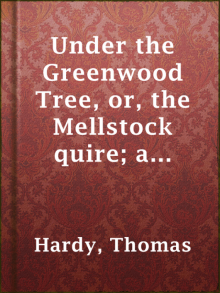 Under the Greenwood Tree; Or, The Mellstock Quire
Under the Greenwood Tree; Or, The Mellstock Quire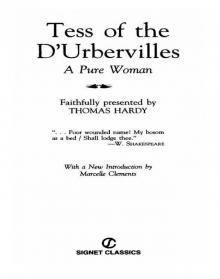 Tess of the D'Urbervilles
Tess of the D'Urbervilles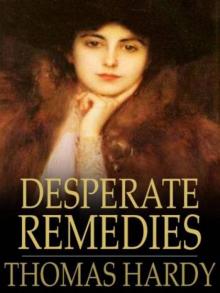 Desperate Remedies
Desperate Remedies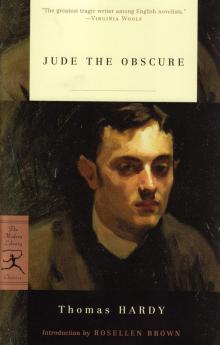 Jude the Obscure
Jude the Obscure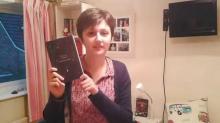 Two on a Tower
Two on a Tower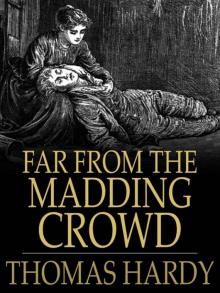 Far from the Madding Crowd
Far from the Madding Crowd The Return of the Native
The Return of the Native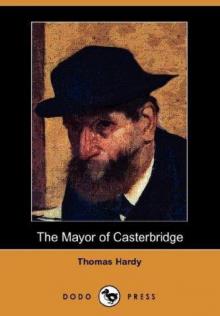 The Mayor of Casterbridge
The Mayor of Casterbridge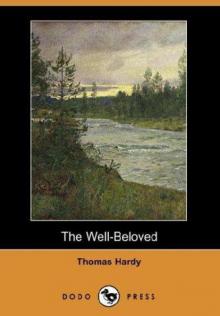 The Well-Beloved
The Well-Beloved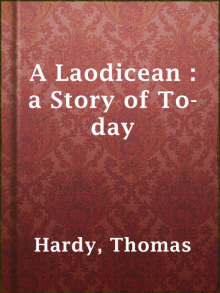 A Laodicean : A Story of To-day
A Laodicean : A Story of To-day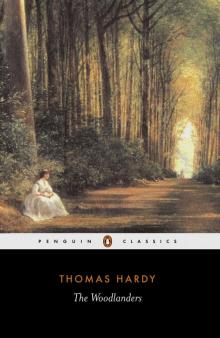 The Woodlanders
The Woodlanders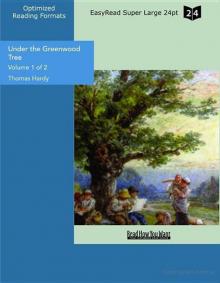 Under the Greenwood Tree
Under the Greenwood Tree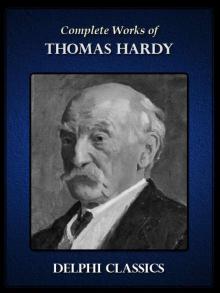 Complete Works of Thomas Hardy (Illustrated)
Complete Works of Thomas Hardy (Illustrated)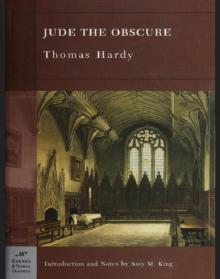 Jude the Obscure (Barnes & Noble Classics Series)
Jude the Obscure (Barnes & Noble Classics Series)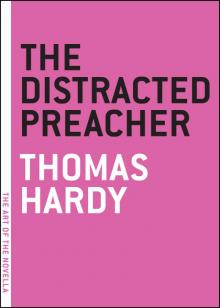 The Distracted Preacher
The Distracted Preacher